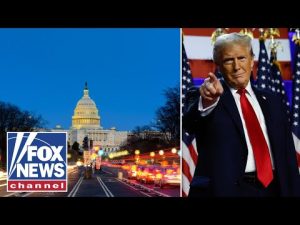**Gold Prices Skyrocket: Is Inflation on the Horizon?**
In a surprising twist that has economists scratching their heads, the price of gold recently surged to a staggering $3,000 an ounce. This spike isn’t just a shiny bauble for wealth management; it’s a harbinger of potential economic trouble and a sign that the Federal Reserve may be in over its head. Amidst its claims of reigning in inflation, the Fed seems to be overlooking a critical indicator—gold itself.
Historically, gold has been a reliable gauge of economic stability. For over 4,000 years, its value has endured, serving as a trustworthy barometer for what is happening with our currency. When the price of gold rises, it typically signals that the value of the dollar is falling. And right now, there’s little reason to believe the Fed truly understands what this soaring gold price means. They appear more focused on numbers coming from their data tables than on the actual pressures making prices rise in the real world.
The central bank believes it’s combating inflation effectively, using interest rate increases to try and put a leash on rising prices. But with the price of gold climbing steeply over the past few months—a whopping 60% since mid-2023—it’s clear that something is amiss. It seems the Fed may be in a state of denial, thinking they can keep inflation at bay by merely adjusting rates instead of addressing the root causes, like production disruptions from past pandemics or looming government regulations.
It’s essential to note that not all price changes come from monetary factors. Non-monetary inflation can arise from things like natural disasters or wars that disrupt production. The Fed, however, has been adamant that slowing the economy will curtail inflation. This leads to the dangerous notion that they may misinterpret the underlying causes of rising prices, potentially triggering a political backlash if their policies drive the economy into a downturn.
As the price of gold continues to climb, it’s becoming increasingly apparent that future inflation could be on the way. Should the Fed persist in ignoring this significant signal, Americans may soon find themselves facing economic challenges. With the dollar potentially losing value, the public could grow frustrated with the Fed’s strategies, leading to questions about its very existence in its current form. The maxim “what goes up must come down” might apply to rocky mountain peaks, but when it comes to gold prices, the stakes are much higher.
In conclusion, it’s time for the Federal Reserve to take a long, hard look at gold’s climbing price. They may be underestimating the implications of what this trend suggests about our economy. As we move further into uncertain times, keeping a close eye on gold might not just be in the interest of investors, but in the interest of all Americans hoping to navigate the stormy economic waters ahead.







